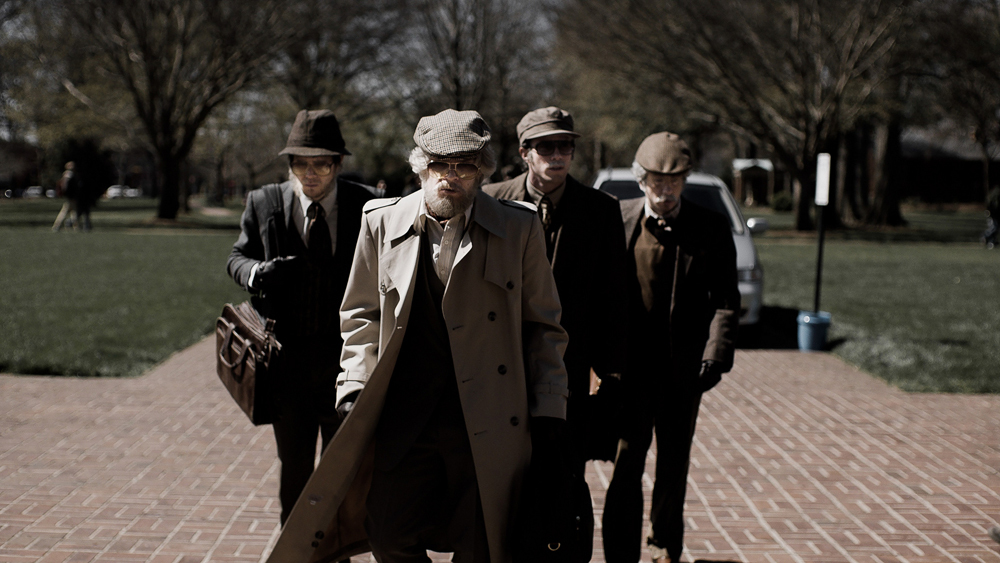File Under 2018 #71: American Animals
/What it's about: Warren Lipka [Evan Peters] is a college student at the University of Kentucky on an athletic scholarship that is a bit of a bad apple. After hearing about a collection of rare books worth millions from his friend Spencer [Barry Keoghan], the two hatch a plan for a heist. They enlist two other college friends [Eric, the brains, and Chase, the rich getaway driver] and put together the logistics for this complicated job. In order to pull it off, they'll have to do it in plain sight, under heavy security, and they might have to hurt someone. And it'll only get more difficult once they have their treasure out.
Unorganized thoughts:
Director Bart Layton made a splash with his debut in 2012 with the twisty, insane documentary The Imposter. Doc filmmakers don't typically jump into narrative feature films, but the incredible story of The Imposter showed Layton could weave an excellent tale [I remember hearing about the film being remade as a narrative but I guess that never got traction]. I was curious if this stylish heist film would be a good fit for his transition.
Turns out, it wasn't much of a transition, as despite not being marketed as such American Animals is an intriguing blend of documentary and narrative film forms. Very early into the movie, a voice-over is heard and then the movie cuts to a traditional talking head of someone identified as the "true" version of the character. Throughout American Animals, the story is told by the people who lived it, including the four young men at the center of the heist, their families, and those who knew them.
The talking heads have two basic purposes: to unfold the story through their recollections and to fill in the narrative with their inner-thoughts, motivations, etc. which helps inform the film's themes.
This creates a very strange, though not entirely unique movie. It's balance of documentary and recreation is something like the inverse of Errol Morris's 2017 Netflix mini-series Wormwood, which was primarily a documentary with splashes of narrative filmmaking sprinkled in. A majority of American Animals is the core narrative story, but the talking heads prove to be an important guide and Layton uses them for entertaining and cross-genre effect.
The documentary form gives the narrative a more performative breaking of the line between supposed reality and fiction. Most "based on true events" films are told at a distance but in a way that tries to grab something real -- many of these films go to the lengths of telling the audience that no matter the crazy things that are going to happen, please believe this is a true story. Here, it is never really a question that the story taking place is a version of the story as these individuals lived it.
In fact, the film liberally plays with the inconsistencies in memory and story. The narrators occasionally break into the story to refute or revise what is shown. There are even moments when the true versions come into the narrative -- the first is a funny, self-referential beat where Evan Peters asks his real life counter-part if this is how the moment actually went down, the second instance is even a bit haunting, like a sad warning from a future self.
The real versions of the characters are truly characters themselves. American Animals wouldn't be nearly as purely entertaining with their commentary. Through the editing of their talking head segments, they interact with each other, showing their personalities through their individual recollections of their stories.
The actors are extraordinarily cast. Not only are they fine young actors, but they match their real-life counterparts incredibly well. One of the worst cliches of true-life stories is how they end with photographs of the real people being played -- this is supposed to remind us that this is a real story but usually the first response is something like "Ben Affleck is supposed to be *that* guy?" Here, Evan Peters, Barry Keoghan, Blake Jenner, and Jared Abrahamson are all convincing versions of Warren, Spencer, Chas, and Eric. Peters gets the highest marks for both a really good performance and a very good match to Warren, who has the same strange energy in his interview.
Near the end of the film, there is a revelation that maybe we're not supposed to believe the story of one of its storytellers. This is a really interesting idea and plays well within the way American Animals is explicitly told, but it is pretty undercooked. It might be enough to raise an eyebrow but doesn't really hold any actual stakes. If Layton had made a pure documentary with this story, I imagine this final takeaway would have been a bigger key to the story.
As for the narrative side of the film, which I haven't talked much about, it is fine. The heist set-up is pretty standard heist film fun and there is plenty of tension when the heist is actually going down -- interestingly, the narrators go away for this large section of the film, which does give it a more cinematic feel. A different version of American Animals could have probably sustained itself going through the numbers. This version is definitely given an added spark because of the way it is told. It is a notable and worthy gimmick.

